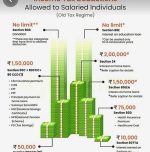Understanding the tax exemption for ₹12 lakhs

The Union Budget 2025-26 has been hailed as a dream budget due to its major tax relaxations.
The government has raised the tax exemption limit to ₹12 lakh, reducing the burden on middle-class taxpayers.
However, this exemption comes with certain conditions that taxpayers must understand for effective tax planning.
Under the new tax regime, the income tax slabs have been revised:
There is no income tax up to ₹4 lakhs.
After that:
- ₹4,00,001 to ₹8,00,000 – 5%
- ₹8,00,001 to ₹12,00,000 – 10%
- ₹12,00,001 to ₹16,00,000 – 15%
- ₹16,00,001 to ₹20,00,000 – 20%
- ₹20,00,001 to ₹24,00,000 – 25%
- Above ₹24,00,000 – 30%
The basic exemption limit has increased from ₹3 lakh to ₹4 lakh. Additionally, the tax rebate under Section 87A has been raised to ₹60,000, ensuring that individuals with net taxable income up to ₹12 lakh pay no tax.
Your Income will be taxable even though it is below ₹12 Lakh in some situations:
The exemption applies only to regular income, excluding special rate income such as capital gains.
For example, if an individual earns ₹10 lakh as salary and ₹2 lakh as capital gains, the salary remains tax-free, but capital gains will be taxed at applicable rates.
The Budget 2024-25 introduced key changes to capital gains taxation:
- Listed Equity Shares & Equity-Oriented Mutual Funds
- Short-term (held <12 months): 20%
- Long-term (held ≥12 months): 12.5% (exempt up to ₹1.25 lakh)
- Debt-Oriented Mutual Funds
- Short-term (held <24 months): Taxed as per income slab
- Long-term (held ≥24 months): 12.5% (if acquired before April 1, 2023), slab rate if acquired later
- Real Estate
- Short-term (held <24 months): Taxed as per slab
- Long-term (held ≥24 months): 20% with indexation or 12.5% without indexation (before July 23, 2024); 12.5% (after July 23, 2024)
- Unlisted Shares
- Short-term (<24 months): Taxed as per slab
- Long-term (≥24 months): 12.5%
Even if your taxable income is within the ₹12 lakh exemption limit, filing an Income Tax Return remains mandatory.
The Income Tax Department requires individuals earning above ₹4 lakh to file an ITR, even if their tax liability is zero.
Image by Mohamed Hassan from Pxhere (Free for commercial use / CC0 Public Domain)
Image Published on July 12, 2018
Image Reference:
https://pxhere.com/en/photo/1440167









Leave a Reply